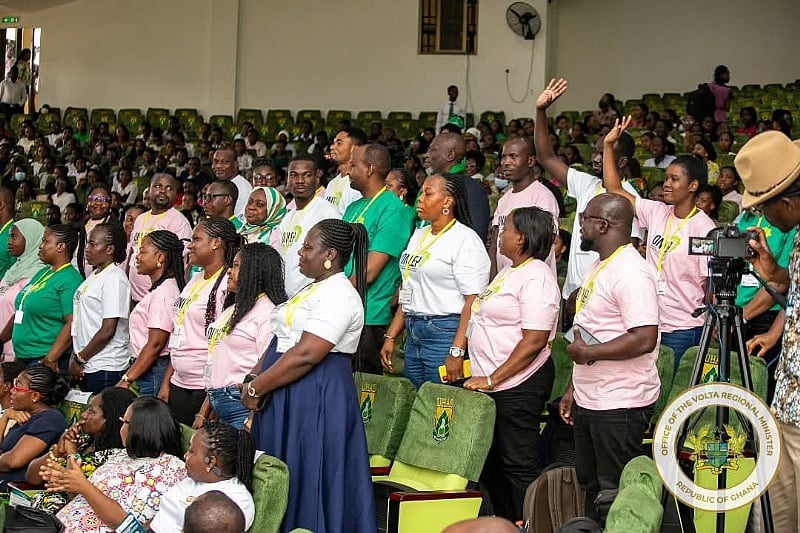Ghana is witnessing a sharp increase in oncology or cancer incidences with approximately 27,385 new cases reported in 2022 alone, with 17,944 associated deaths.
Roughly, 24,000 new cases are being recorded annually, with the Volta Region alone, contributing 16.9 per cent to the national burden with mainly Prostate cancer leading the disease pact.
The Regional Referral Centre, the Ho Teaching Hospital, is constantly grappling with considerable emotional trauma among cancer patients with depression, anxiety, and suicidal ideation common with limited access to mental health support.
Relatives, nurses, and spiritual guides often fill these care gaps.
Mr James Gunu, Volta Regional Minister made these disclosures at the inauguration of a new post graduate certificate programme on Oncology Nurse Leadership Programme (ONLEP) in Africa and Co-developed by the University of Health and Allied Sciences (UHAS), City Cancer Challenge Foundation (C/Can), the International Society of Nurses in Cancer (ISNCC) and Amgen, Funder, a Biotechnology and pharmaceutical company.
ONLEP, a five-year programme to be attended in cohorts, seeks to foster leadership development skills, promote clinical excellence, support professional growth, facilitate networking and collaboration, encourage research and evidence-based practice, and nurture advocacy skills, to impact on cancer care delivery and greater patient outcomes.
It is estimated that each of the 30 students in the first cohort certificate programme will spend six months with a two-week face-to-face session at the beginning and one week at the final week of the programme leading up to their graduation.
Mr Gunu commended UHAS and partners for their visionary initiative to elevate oncology nursing into a leadership-driven discipline essential for modern, patient-focused cancer care.
He said the 2025 Budget reflected clear prioritization and the introduction of the Ghana Medical Care Trust Fund, dedicated to financing cancers, hypertension, heart disease, and diabetes treatment came at the most opportune time.
He disclosed that the expansion of Free Primary Healthcare, and the uncapping of the National Health Insurance Levy, would generate nearly GHS 9.9 billion to fund NHIS services, including cancer treatment.
The Minister said ONLEP aligned precisely with Ghana’s 2025 Budget priorities namely, building human capital and strengthening healthcare systems and complemented the national cancer control plan and WHO’s broader objectives for improved screening, diagnosis, and access to treatment.
He said the Regional Coordinating Council would ensure the regional health system supports the programme to succeed.
“To the nurse-leaders starting ONLEP today: you are at the forefront of transformative change. Lead with clinical excellence, compassion, resilience, and courage. Extend caring beyond medical treatment to emotional and psychosocial healing. Advocate for patients, mentor peers, drive reforms and build oncology units that champion hope, not fear.”
“Cancer may be one of our greatest public health challenges, but with your leadership, strong partnerships, and commitment, we can shift the trajectory for Volta, for Ghana, and for Africa,” Mr Gunu said.
Professor Lydia Aziato, Project Lead and Vice-Chancellor, UHAS, said the programme aimed to train oncology nurses as leaders to develop strong foundations in leadership, gain in-depth understanding in health services organization, integrate psycho-oncology, stress and change management in practice, develops skills in research and gain knowledge in policy development and advocacy in oncology.
She said the programme envisaged to establish international partnership to train some 240 nurse oncologists in Africa and expand the scheme to include other professionals in the health sector.
“UHAS is poised to lead this partnership to becoming a hub for leadership training for nurses and midwives and other health professionals in Africa and beyond. ONLEP is a catalyst to this dream.”
Dr Fiona Braka, WHO Country Director, said this innovation would lead the needed change and increase cancer care.
She said Ghana had less than 30 fully trained oncologists thereby reducing its ability to deliver cancer services.
She believed the ONLEP initiative would elicit leadership that was grounded in ethical principles, professionalism, clinical and administrative competences and held the potential to enhance service delivery.
She said the programme is well-aligned with WHO’s global strategy for human resources for health, the global risk cancer initiative and the regional strategy for cancer prevention and control saying “the first cohort is the heartbeat of the programme, own it, nurture others for sustenance and progress.”
“To support oncology nurses across the sub-Saharan Africa region not only improves their skills and competencies; it also will lead to better healthcare delivery and in the medium-term, better health outcomes as well. We are incredibly pleased to partner with UHAS, C/Can and ISNCC on this key initiative,” Sean Lybrand, Executive Director, Access to Healthcare, Amgen Inc. said.
Togbe Adze II, Divisional Chief of Fodome Agbesia, who presided, commended the stakeholders for the initiative and called for greater support from across all fields for success.
There were solidarity messages from Ghana College of Nurses and Midwives (GCNM), Nurses and Midwives Council (NMC), Ghana Health Service (GHS), Ghana Registered Nurses and Midwives Association (GRNMA), and Ghana Medical Association (GMA).
GNA


